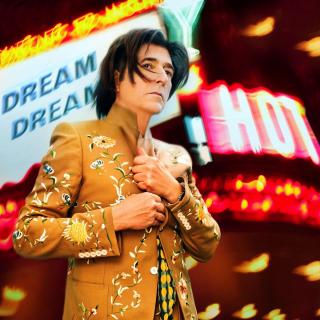https://nowtoronto.com/music/features/ensign-broderick-jason-sniderman-…
Jason Sniderman started dreaming of rock stardom when he was eight and invented his musical alter ego, Ensign Broderick, when he was 12. Now, 47 years later, he’s finally ready to release his debut record.
Feast Of Panthers (out March 9 on Six Shooter) combines recently written material with songs Sniderman wrote over four decades ago but which haven’t seen the light of day until now.
Seated in a booth at a Vietnamese restaurant on Dundas West, Sniderman explains the origin story of his new wave persona.
“It’s conceived and cultivated with a certain amount of innocence,” he says
Even the name bears the imprint of youth: “It just was a cooler-sounding name [than my own],” he smiles. “Ensign” rhymed with “Jensen,” the manufacturer of his favourite car.
There are a few contributing factors for the decades-long chasm between writing and releasing the music. One, he says, was that, when he played it for his friends in the 70s, reception was lukewarm at best. “Some of this music was just too weird for people back then.”
The muted response was discouraging. “Dealing with indifference or negative responses for a long time, you build up some scar tissue,” he says. “That scar tissue isn’t easily worn away.”
Despite shelving his hopes for Ensign Broderick, Sniderman remained a hidden cornerstone in the Toronto music scene. He worked with his father, Sam Sniderman, for years at iconic Toronto record store chain Sam the Record Man. In the 80s, he joined Canadian new wave group Blue Peter and went on to contribute piano work for records by Randy Bachman and Rush. By 2007, he was playing with Toronto roots-rock outfit NQ Arbuckle. Through it all, he skirted the spotlight.
“I always tried to keep a relatively low profile,” he shrugs. “That’s just my personality. I don’t socialize that much unless I’m actually playing a gig, and normally after the gig, I split.”
It wasn’t until he mentioned his solo work in conversation with Six Shooter founder Shauna de Cartier that his project resurfaced in earnest, though Sniderman admits that it took a while before he felt comfortable revealing the existence of Ensign Broderick. “I said, ‘I’m too insecure about it. I just do it for my own edification. It’s my thing.’”
When Sniderman, understandably reticent, declined to share the music, de Cartier sought it out herself. On his SoundCloud page, which he had started five years ago to archive his music but rarely shared with anyone, she found nearly five albums’ worth of gorgeous new wave balladry, fluorescent R&B, operatic rock and macabre piano-pop – a lifetime’s worth of influences, all relayed through a cavernous baritone.
When she expressed her admiration, Sniderman thought she was just being friendly. After decades of his compositions collecting dust, it seemed incomprehensible that someone would be interested in them. Once he realized her compliments were genuine, he opened up.
“I think [Shauna] made it safe for me. It made me feel a bit more secure in talking about it with her,” he says.
Anxieties began to dissipate, and suddenly it seemed Ensign Broderick could indeed be brought back to life.
“The more secure I felt about releasing it, the less likely I thought it was gonna be like the end of Carrie.”
With an army of collaborators including Tanya Tagaq’s violinist Jesse Zubot and ex-Protest the Hero bassist Arif Mirabdolbaghi, Sniderman resuscitated the old songs with new arrangements and wrote new tracks like the baleful Summer Snow and the Disney-ish whimsy of closer Accidence PSA.
Some songs were even partially recorded decades ago. Sniderman explains that the vocal track on lead single True Shame was recorded in 1976. “I recorded it basically in my bedroom,” he says. Of performing the song now, he jokes, “I had to drop it a few keys because my voice isn’t that high any more.”
The tracks are rooted in Toronto, past and present. True Shame draws from summer nights on Yonge in the 70s, a memory that, for Sniderman, is still vivid. “I can still see the city in that way. It doesn’t seem that dramatically different than when I was a kid, even though I know it is.”
Regardless of public response, Sniderman feels it’s important to finally bring Ensign Broderick to the public. “It’s hard for me to believe,” he says. “If I only wanted my own sense of gratification, then I’d be in my bedroom still. I want people to love it. If they hate it, then I’d like to know why. But I just don’t want people to be indifferent to it.
“I want it to mean something.”

